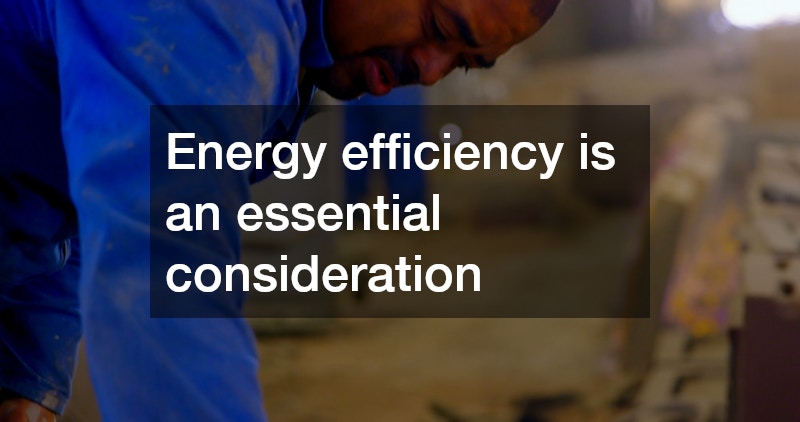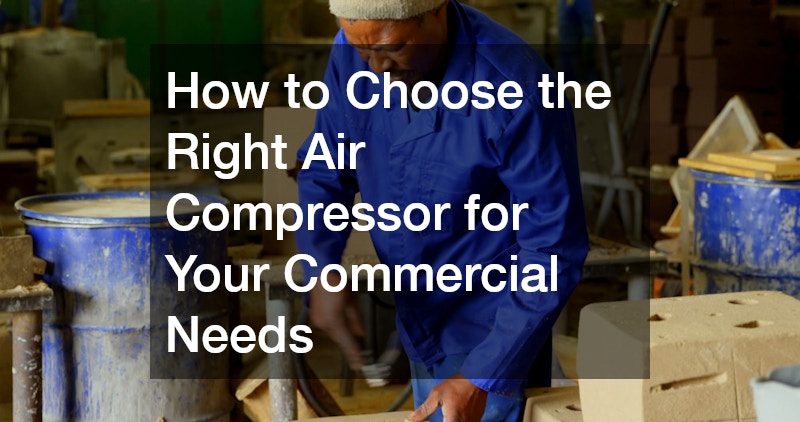Choosing the right air compressor for your commercial needs begins with understanding the specific requirements of your operations. Different industries such as manufacturing, automotive repair, and construction have unique needs that dictate the size and type of air compressor required. Evaluating the day-to-day tasks and the demand for compressed air will influence your decision significantly. It’s essential to determine whether your operations require continuous airflow or intermittent usage to make an informed choice. By identifying these parameters, you will narrow down your options to compressors that will enhance productivity and ensure efficient energy consumption.
Moreover, commercial air compressor contractors often emphasize the importance of matching the compressor capacity with the demand level in your facility. This involves calculating the cubic feet per minute (CFM) and pressure (PSI) requirements, which are crucial in selecting a unit that can handle your workload efficiently. An undersized compressor will lead to tool inefficiencies and increased wear, whereas an oversized unit results in unnecessary energy expenses. Consulting with experts or using online tools can help you determine your exact needs, ensuring you purchase a compressor that aligns with your operational goals. The right fit not only optimizes performance but also contributes to prolonged equipment life.
Additionally, understanding your infrastructure capabilities is vital before purchase. Evaluate the available power sources such as electricity, gasoline, or diesel, and ensure that your chosen compressor is compatible. Some compressors rely on three-phase power, requiring specific installations. Factor in the noise levels as well, especially if the compressor will be used in populated areas or indoor spaces. Considering these infrastructure elements helps in selecting a compressor that integrates seamlessly into your existing setup, promoting a smooth transition and minimal operational disruptions.
Types of Air Compressors for Commercial Use
Air compressors can be generally categorized into three primary types: reciprocating, rotary screw, and centrifugal compressors. Reciprocating compressors are most suitable for small operations with moderate air demands, given their simplicity and lower initial costs. In contrast, rotary screw compressors offer continuous airflow and are preferred for larger operations or industries with higher demand for air. Additionally, centrifugal compressors are used in heavy-duty applications where a large volume of air is needed continuously. Each type has distinct advantages and disadvantages depending on the specific commercial needs, necessitating a thorough understanding before purchase.
Reciprocating compressors include a piston-driven design, where the reciprocating motion creates suction and compression of air. These compressors are typically oil-lubricated or oil-free, with oil-free models being favored in industries requiring pollution-free air like food and pharmaceuticals. Rotary screw compressors, on the other hand, use two interlocking screws to compress air, providing a consistent and quieter operation. They require less maintenance than reciprocating models, offering higher efficiency and longevity in demanding environments. It’s important to compare your commercial requirements with the features of each compressor type to determine the best fit.
Centrifugal compressors utilize a different mechanism, employing a high-speed rotating impeller to generate compressed air through centrifugal force. These compressors are best suited for large-scale industrial operations with a constant need for high-pressure air. While they offer the benefit of producing immense volumes of air at high efficiency, the complexity and cost make them suitable for only particular commercial applications. When selecting the right type of compressor, it’s crucial to consider the total cost of ownership, factoring in maintenance, energy consumption, and operational demands. Partnering with knowledgeable air compressor contractors can provide insights into which model type will offer the optimal balance of efficiency and cost.
Considering Energy Efficiency and Costs
Energy efficiency is an essential consideration in choosing the right air compressor due to its direct impact on operational costs. Compressors are significant consumers of electricity, often accounting for a notable portion of total energy usage in industrial facilities. Investing in energy-efficient models, like those equipped with variable speed drives (VSDs), can lead to substantial cost savings. VSD compressors adjust the motor speed based on air demand, reducing energy wastage during low-demand periods. Prioritizing energy efficiency not only supports sustainability goals but also enhances your bottom line through reduced utility expenses.
The initial purchase price of an air compressor is just one aspect of total ownership cost. Maintenance expenses, repair needs, and energy consumption accumulate over the compressor’s lifespan. Rotary screw compressors, for example, offer lower maintenance costs over time compared to reciprocating compressors due to their simple design and fewer moving parts. Understanding the lifecycle costs of different compressor models helps in budgeting and forecasting financial commitments accurately. Consulting with air compressor contractors provides clarity on long-term savings versus upfront investments, guiding your decision-making process towards the most cost-effective option.
Additionally, implementing proper maintenance practices enhances energy efficiency and reliability. Routine inspections, timely oil changes, and air filter replacements minimize wear and maximize operational capacity. Regularly monitoring the compressor’s performance helps in detecting potential problems early, preventing costly repairs and downtime. Ensuring that your compressor operates at optimal efficiency cuts down on energy usage and extends the system’s life. Partnering with a reliable maintenance provider ensures that your air compressor remains an asset rather than a liability, contributing positively to your commercial success.
Navigating Brand and Warranty Choices
Once you have narrowed down the technical specifications, the next step is choosing a reliable brand that aligns with your commercial needs. Experienced air compressor contractors often recommend researching brands with a proven track record in producing high-quality, durable compressors. Reviewing customer testimonials and industry reviews can provide insights into a brand’s reputation and reliability. Leading brands usually offer comprehensive warranty packages, providing insurance against unexpected failures or defects. Choosing a brand with an excellent track record and supportive warranty enhances peace of mind and assurance of long-term performance.
Warranty offerings from manufacturers vary widely, encompassing specific parts or extended coverage for the entire unit. Opting for a compressor with a solid warranty suggests the manufacturer’s confidence in its product and commitment to customer satisfaction. It’s crucial to understand the warranty terms fully, including what components are covered and for how long, to avoid future complications. A good warranty should offer protection against manufacturing defects, covering repairs and replacements without excessive bureaucracy. An in-depth understanding of warranty options ensures that your investment is safeguarded against unforeseeable issues.
Lastly, consider additional support services provided by manufacturers or authorized dealers. These services can include professional installation, regular maintenance contracts, and customer support resources. Brands offering extensive customer service options facilitate a positive ownership experience, enhancing overall satisfaction. Engaging with companies that value post-purchase support can prevent operational hiccups and ensure that your compressor functions seamlessly. By prioritizing brands that invest in both product excellence and customer care, you make an informed decision that aligns with your commercial aspirations.

